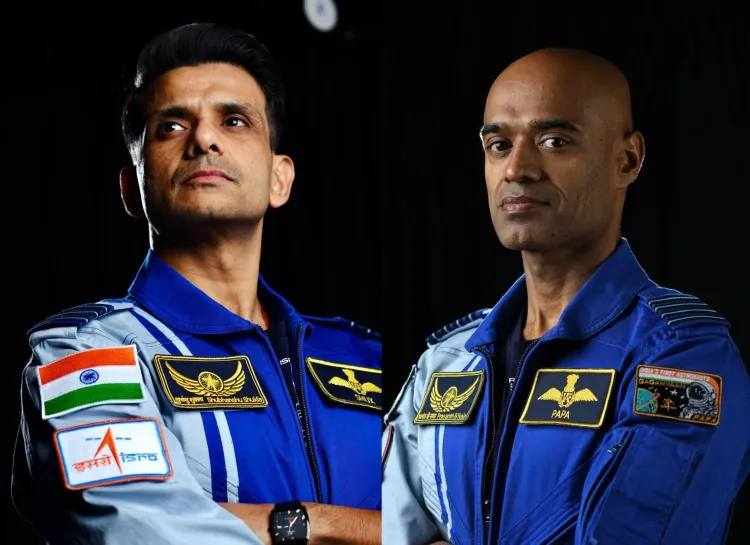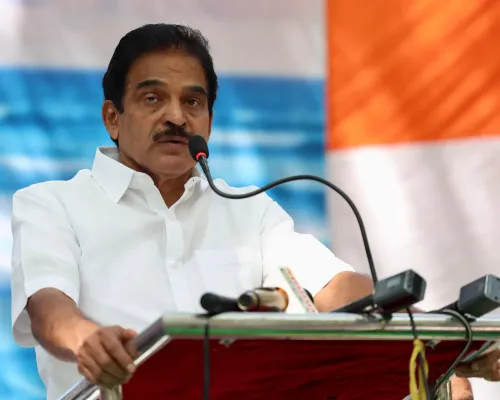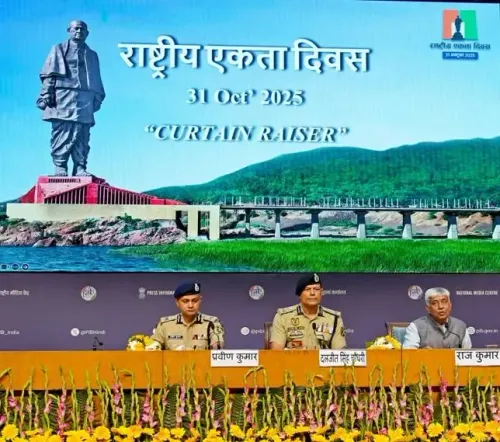Will Indian Astronaut Shubhanshu Shukla Transform Space Nutrition?

Synopsis
Key Takeaways
- Shubhanshu Shukla conducts pioneering experiments in space.
- Collaboration between ISRO, DBT, and NASA.
- Focus on microalgae and cyanobacteria for sustainable nutrition.
- Indigenous biotechnology kits developed for microgravity.
- Significant step for India's space research capabilities.
New Delhi, May 31 (NationPress) Indian astronaut and Group Captain Shubhanshu Shukla is poised to carry out groundbreaking food and nutrition experiments aboard the International Space Station (ISS) during the forthcoming Axiom Mission 4 (Ax-4), as announced by Union Minister Dr. Jitendra Singh on Saturday.
The experiments, designed through a collaboration between the Indian Space Research Organisation (ISRO) and the Department of Biotechnology (DBT), with assistance from NASA, aim to innovate space nutrition and develop self-sustaining life support systems essential for extended missions in space.
Dr. Singh indicated that the initial ISS experiment will investigate how microgravity and space radiation affect edible microalgae, a highly promising and nutrient-dense food source.
This study will analyze significant growth parameters and the variations in transcriptomes, proteomes, and metabolomes of different algal species in the unique environment of space compared to Earth.
As an illustration of Atmanirbhar Bharat, the space biology experiments will utilize biotechnology kits developed locally under the DBT.
These specialized kits, crafted for microgravity environments, have been meticulously designed and validated by Indian scientists to ensure accuracy and dependability in space research.
Their utilization signifies a pivotal achievement in India's capability to provide top-tier scientific tools for cutting-edge research and highlights the country's increasing self-sufficiency in vital technologies for both space exploration and biotechnology.
“Microalgae grow swiftly, yield high-protein biomass, consume carbon dioxide, and release oxygen — rendering them ideal candidates for sustainable space nutrition and closed-loop life support systems,” stated Dr. Singh.
The second experiment will explore the growth and proteomic responses of cyanobacteria, particularly Spirulina and Synechococcus, under microgravity conditions, utilizing urea- and nitrate-based growth media.
This research will assess the potential of Spirulina as a space “superfood” due to its high protein and vitamin levels, examine the viability of utilizing nitrogen sources from human waste, such as urea, for cyanobacterial development, and investigate how microgravity influences cellular metabolism and biological efficiency.
Such findings are crucial for the advancement of closed-loop, self-sustaining life support systems that are vital for lengthy space missions.
“These organisms could play a pivotal role in carbon and nitrogen recycling in spacecraft and future space habitats,” the minister remarked.
Shukla is among the first cohort of Indian astronauts trained for human spaceflight, with Group Captain Prasanth Balakrishnan Nair acting as his designated backup.
The Ax-4 mission, orchestrated by Axiom Space and launched via the SpaceX Falcon 9, marks a significant milestone for India as it embarks on its first astronaut-scientist-led space biology experiments aboard the ISS.









